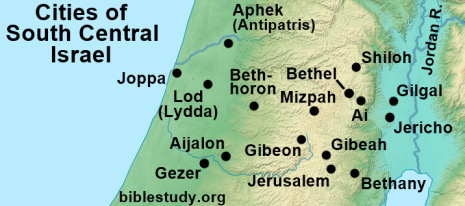Ai is the second city conquered by Joshua and the children of Israel after they entered the Promised Land (Joshua 7:2 - 5, 8:1 - 29).
Aijalon
Joshua, while leading the Israelites against the Amorites, desperately needed more time to complete his victory (Joshua 10:12 - 14). To accomplish this goal, he took the audacious move of commanding the moon to stand still in the valley of Aijalon and the sun to remain in place over Gibeon! Even more incredible is that God heard his request and carried out this unique astronomical event.
"And there was no day like that before it or after it that the Lord listened to the voice of a man, for the Lord fought for Israel" (Joshua 10:14).
Aphek (Antipatris)
The Old Testament city of Aphek, located within the Plain of Sharon, is called Antipatris in the New Testament (Acts 23:31). Aphek was the staging location for two planned Philistine attacks on Israel (1Samuel 4:1, 29:1).
Beth-horon
The city of Beth-horon was founded by a woman named Sherah who was a daughter of tribal founder Ephraim (1Chronicles 7:24).
Bethany
Bethany was where Jesus' friends Mary, Martha, and Lazarus lived. It was in the outskirts of the city that Christ raised Lazarus from the dead after he had been buried for four days (Luke10:38 - 41, John 11)!

Bethel
Located close to Ai, Bethel is one of the first locations Abraham camped in when he entered the land of Canaan (Genesis 12:5 - 8). A school for prophets was also located in the city (Genesis 28:10 - 22, 2Kings 2:3).
Gezer
Gezer was given by God to the tribe of Ephraim (Joshua 16:3, 10). The Ephraimites, however, were never able to drive out the Canaanites from the city (Judges 1:29). Gezer would remain a Philistine possession for many years.
Gibeah
Gibeah is where Saul, Israel's first human king chosen by God, was born. He continued to live in the city after becoming ruler and made it the country's administrative center (1Samuel 10:26, 15:34, 23:19).
Gibeon
Joshua, while leading the Israelites in battle against the Amorites, desperately needed more time to complete his victory. He therefore commanded the moon to stand still in the valley of Aijalon and the sun to remain in place over Gibeon. God carried out this amazing miracle for a twenty-four hour period, thus giving Joshua total victory over the five Amorite kings that came against him (Joshua 10:12 - 14).
Gilgal
After crossing the Jordan River the Israelites, who had wandered the desert for forty years, camped in Gilgal (Joshua 4:19 - 20). While they camped, they kept the Passover for the first time in thirty-nine years (Numbers 9:1 - 5). Gilgal was also where the prophet Samuel anointed Saul as the first human king over Israel (1Samuel 11:12 - 15).
Jericho
Jericho was the first city conquered by Israel after they cross the Jordan River (Joshua 6). Jesus' parable of the Good Samaritan is based on a man robbed and beaten as he traveled to Jericho (Deuteronomy 34:3, Joshua 6, Luke 10:30 - 37).
Jerusalem
The city of Jerusalem, which sits on seven hills, has been attacked at least twenty-six times throughout its long history. It was David who, after conquering Jebus, renamed it Jerusalem (1Chronicles 11). The area also became known as the city of David (2Samuel 5:7).
Jerusalem became the spiritual and secular capital of Israel under Kings David and Solomon. After the kingdom split in 930 B.C., it became the capital of the Kingdom of Judah.
Jerusalem was the place where Jesus was crucified, buried and resurrected from the dead by God. It is where, on Pentecost in 30 A.D., the New Testament church was founded (Matthew 27 - 28, John 19 - 20, Acts 2).
Joppa
Joppa, for centuries, was Israel's only useable harbor on the Mediterranean Sea.
Joppa is where Peter raised Dorcas from the dead, an incredibly rare miracle that may have contributed to the rise of a Christian church in the city. It is also where he experienced his well-known vision of unclean animals (Acts 9:36 - 43, 10:9 - 18).
Lod (Lydda)
The ancient city of Lod, located on the Plain of Sharon, was renamed Lydda in the New Testament. Peter, while passing through the city, found several Christians living in the town. His healing of a man who had been bedridden for eight years helped spread the gospel throughout the area (Acts 9:32 - 41).
Mizpah
Mizpah is sometimes spelled Mizpeh in the KJV Bible. Located north of Judah's territory, it was given to the tribe of Benjamin as a land inheritance (Joshua 18:26).
Mizpah was a city from which the prophet Samuel judged Israel and one of the two places Saul declared king. It was also the place the people gathered during serious national emergencies (Judges 20:1 - 3, 1Samuel 7:5 - 16, 10:17 - 25).
Shiloh
The Ark of the Covenant, along with its tabernacle, was initially placed in the city by Joshua (Joshua 18:1). The Ark remained in Shiloh until 1085 B.C. when it was taken as a war prize by the Philistines (1Samuel 4:1 - 17).
Shiloh was also the place where lots were cast to decide how land, west of the Jordan River, would be divided among the children of Israel (Joshua 18:1 - 19:48).